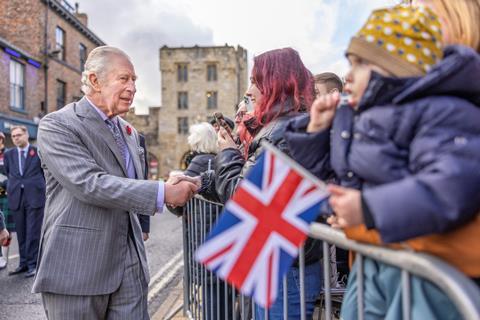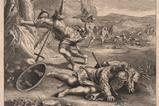What do a funeral and a coronation tell us about Christian Britain? A lot, as it turns out, says Bible Society’s Mark Woods. He unpacks their latest research

When Queen Elizabeth II died in September last year, the shock to the nation was much greater than – arguably, at least – the death of a 96-year-old woman ought to have been.
Perhaps it was because it seemed to come out of the blue, or perhaps it was just that she’d always been around and it was hard to imagine anyone taking her place.
In moments of great significance, the Bible retains its power to speak straight to the heart of individuals
Immediately, however, Operation London Bridge swung into action. The mourning period and funeral had been well planned, and among the key ingredients of these momentous national events was the presence of Christianity in general and the Bible in particular.
Unapologetically Christian
This was an unapologetically Christian funeral for a deeply Christian monarch; a traditional Anglican rite in which the words of the Authorised, or King James Version of the Bible were spoken to an audience of millions.
In fact, we can confidently say that this was the largest public scripture event in history. If someone had watched all of the official events following the death of the late Queen, they would have heard 3,923 words of scripture, forming 198 verses from 13 books of the Bible, in three languages – English, Welsh and Gaelic.
So much is public record. However, Bible Society commissioned YouGov to undertake in-depth research about how people responded to what they saw and heard of Christianity and the Bible during the period of mourning and the funeral – and it’s not what we might have thought.
For years now, the prevailing narrative has been one of hostility towards religion, and towards Christianity in particular. This seemed to be confirmed by the recent census results showing that fewer than half of people in England and Wales now identify as Christian (though as we said at the time, there’s a different story to tell about that).
But we found that when it came to mourning the Queen, this wasn’t true at all.
Moving and relevent
Overwhelmingly, those who engaged in the funeral events believed the presence of Christianity was appropriate. Seventy-nine per cent agreed it was appropriate given the faith of the Queen as an individual, while 72 per cent said it was appropriate for a British royal event. Only 12 per cent said they found the prominence of Christianity alienating, while 55 per cent said they were happy that the events were wholly Christian. Even among those saying they were ‘non-religious’, 36 per cent said the same.
More on the coronation:
-
From crown to orb…Everything you need to know about the coronation’s 5 sacred objects
-
King of kings: The Christian message at the heart of the coronation
-
Explainer: The anointing of King Charles III and why it matters
-
God save the King? There’s only one king Christians should put their hope in, and it’s not Charles
When it came to the Bible, a third said the Bible passages were moving and 31 per cent said they were relevant to their feelings at the time. Yes, this is a minority, but it’s still far higher than the proportion of the population that actually attends church (around ten per cent monthly).
But what about the Coronation? There’s been much angst over whether it should be a wholly Christian affair, or whether elements of other religious traditions should be admitted. Our research shows far more support (31 per cent) for keeping royal events Christian than making them multi-faith (16 per cent) or wholly secular (15 per cent) – though there’s a large proportion of ‘don’t knows’ and ‘neithers’ in there as well.
Enduring faith
So what does this say about Christian Britain? Certainly, it doesn’t say that revival is about to break out. However, it does tell us that the notion that we’re a secular country in which religion has had its day and should be relocated to the margins of public life is just not true.
Yes, more than half of people in England and Wales claim not to be Christian. But that doesn’t necessarily mean they want to be rid of public Christianity, or that they think there’s something wrong or inappropriate about its presence at great events.
Somehow, deeply entwined in our society’s roots, a sense of the value of what the Church can offer endures. Furthermore, in the context of moments of great national significance, the Bible retains its power to speak straight to the heart of individuals – even in Jacobean English.
Our research shows far more support for keeping royal events Christian than making them multi-faith
All of this ought to encourage Christians to push back against the notion that we’re being persecuted or that the world is against us. Based on our research into this particular issue, we might conclude that there’s a large chunk of the world that is indifferent to us, but also many who are vaguely positive. We should also take heart from the relative warmth towards the Bible.
But we should also hear the voices of the 25 per cent who said the Bible readings were “boring”, and the quarter of young people who said they were “difficult to understand”. Yes, it was the Authorised Version, but this still indicates the scale of the challenge facing Bible communicators.
And the Coronation? Well, King Charles III has spoken plainly about his personal faith, and whatever shape the service takes there’s no doubt that it will be fundamentally Christian. His subjects, as it turns out, are fine with that.
Download Bible Society’s report: Mourning Elizabeth: Christianity and the Bible in the funeral of Queen Elizabeth II


































1 Reader's comment